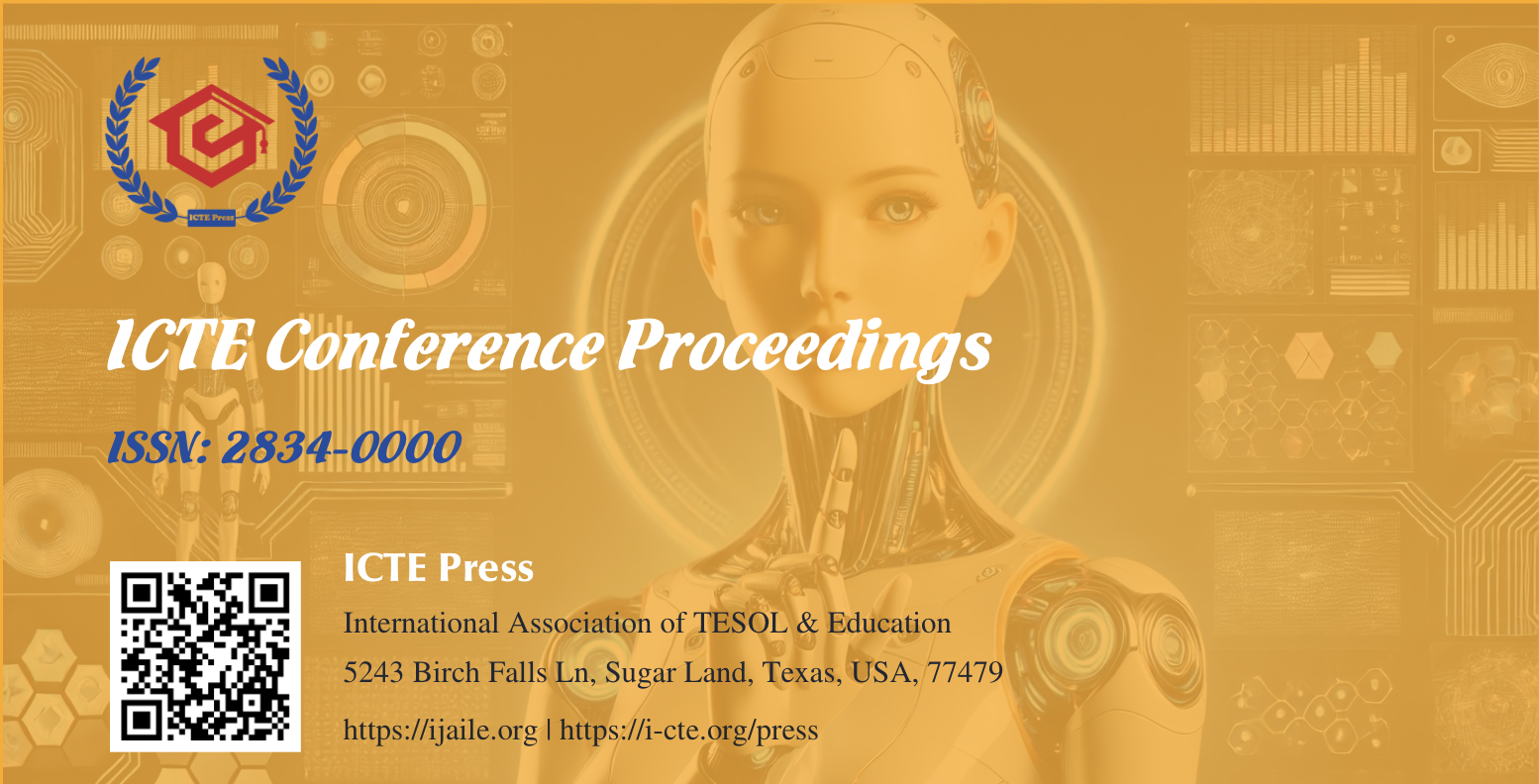The Impact of Using Language Games on Motivating High School Students To Learning English Speaking Skills
DOI:
https://doi.org/10.54855/ictep.11Keywords:
Language games, speaking skills, motivationAbstract
The use of language games to increase high school pupils' motivation for learning English speaking abilities. This essay examines how language games are used at U Minh Thuong High School to teach students how to speak English. Eighty teenagers from two high school classrooms made up the participants. They were 36 boys and 44 girls in grade 11 at U Minh Thuong High School, and they ranged in age from 16 to 17. A questionnaire and an interview on participants' opinions on the usage of language games in English speaking lessons served as the study's primary data collection instruments. The goal of this study is to identify the most effective strategies for encouraging speaking in the classroom, as well as what language activities are most effective for enhancing academic achievement and generating interest in children who are learning English.
References
Ali, M. S., & Pathan, Z. H. (2017). Exploring Factors Causing Demotivation and Motivation in Learning the English Language Among College Students of Quetta, Pakistan. International Journal of English Linguistics, 7(2), 81–89.
Amrullah, A. Z. (2015). Developing Language Games to Teach Speaking Skills for Indonesian Senior High School Learners. JEELS (Journal of English Education and Linguistics Studies), 2(2).
Andriyani, N. (2015). Using the Direct Method in Teaching to Improve Students’ Speaking Skill at Purikids Language Course. Yogyakarta: Yogyakarta State University.
Bailey, K. M. (2003). Speaking. Practical English Language Teaching, 47–66.
Bailey, K. M., & Nunan, D. (2005). Practical English Language Teaching: Speaking.
Baker, J., & Westrup, H. (2003). Essential Speaking Skills. Bloomsbury Academic. https://books.google.com.vn/books?id=1ZHX_kgswP8C
Bygate, M. (2003). Language Teaching, a Scheme for Teaching Education: Speaking.
Cameron, L. (2001). Teaching Languages to Young Learners. Cambridge University Press. https://books.google.com.vn/books?id=RqEtek4elD0C
Creswell, J., & Plano Clark, V. (2018). Designing and Conducting Mixed Methods Research. Thousands Oaks.
Creswell, J. W. (2014). A Concise Introduction to Mixed Methods Research. SAGE Publications. https://books.google.com.sg/books?id=51UXBAAAQBAJ
Dewi, R., Kultsum, U., & Armadi, A. (2016). Using Communicative Games in Improving Students’ Speaking Skills. English Language Teaching, 10, 63. https://doi.org/10.5539/elt.v10n1p63
Doan, H. D. (2011). Motivation in the Development of English Speaking Skills by Second Year Tourism Major Students at Sao Do University. VNU Journal of Foreign Studies, 27(3).
ElNaggar, A. I. M. (2020). Investigating Problems of Speaking Skill: A Case Study at Al-Baha University. Available at SSRN 3521868.
Gardner, R. C. (2001). Language Learning Motivation: The Student, the Teacher, and the Researcher. Texas Papers in Foreign Language Education, 6(1), 1–18.
Gardner, R. C. (2010). Motivation and Second Language Acquisition: The Socio-educational Model. Peter Lang. https://books.google.com.vn/books?id=Ky15oSCIfLwC
Goh, C. C. M., & Burns, A. (2012). Teaching Speaking: A Holistic Approach. Cambridge University Press. https://books.google.com.vn/books?id=BUmyAAAAQBAJ
Ihsan, M. (2016). Students’ motivation in Speaking English. Journal of English Educators Society, 1. https://doi.org/10.21070/jees.v1i1.147
Kaur, D., & Aziz, A. A. (2020). The Use of Language Game in Enhancing Students’ Speaking Skills. International Journal of Academic Research in Business and Social Sciences, 10(12), 687–706.
Levelt, W. J. (1995). The Ability to Speak: From Intentions to Spoken Words. European Review, 3(1), 13–23.
Maryam, S. (2020). Utilizing Communicative Language Games to Improve Students’Speaking Ability. Journal of Languages and Language Teaching, 8(3), 251–263.
Safdarian, Z. (2013). The Effect of Stories on Young Learners’ Proficiency and Motivation in Foreign Language Learning. 2(3), 49.
Singh, K. (2011). Study of Achievement Motivation in Relation to Academic Achievement of Students. International Journal of Educational Planning & Administration, 1(2), 161–171.
Taman, P. (2020). The Use of Communicative Language Games and Its Impact in Efl-Speaking Classroom in Tertiary Level. PROCEEDINGS UNIVERSITAS PAMULANG, 1(1).
Torky, S. A. E. (2006). The Effectiveness of a Task-Based Instruction Program in Developing the English Language Speaking Skills of Secondary Stage Students. Online Submission.
Valipour, V., & Aidinlou, N. A. (2014). The Effect of Language Games on Learning English Listening Speaking Skills of Iranian Pre-school Students. Indian Journal of Fundamental and Applied Life Sciences, 4(2), 647–650.
Van Van, H. (2010). The Current Situation and Issues of the Teaching of English in Vietnam. 立命館言語文化研究, 22(1), 7–18.
Vyas, M. A., & Patel, Y. L. (2015). Teaching English as a Second Language, Second Edition: A New Pedagogy for a New Century. Prentice Hall India Pvt., Limited. https://books.google.com.vn/books?id=SZCQCgAAQBAJ
Wang, Y.-H. (2010). Using Communicative Language Games in Teaching and Learning English in Taiwanese Primary Schools. 工程科技與教育學刊, 7(1), 126–142.
Whitton, N. (2014). Digital Games and Learning: Research and Theory. Taylor & Francis. https://books.google.com.vn/books?id=bUMsAwAAQBAJ
Wimolmas, R. (2013). A Survey Study of Motivation in English Language Learning of First Year Undergraduate Students at Sirindhorn International Institute of Technology (SIIT), Thammasat University. Language Institute, Thammasat University.
Wright, A., Betteridge, D., & Buckby, M. (2006). Games for Language Learning. Cambridge University Press. https://books.google.com.vn/books?id=U9Y_NeY0YMsC
Downloads
Published
How to Cite
Issue
Section
License
Copyright (c) 2022 Ho Thi Thuy Dung

This work is licensed under a Creative Commons Attribution 4.0 International License.
Authors retain copyright and grant the picte the right of first publication with the work simultaneously licensed under a Creative Commons Attribution 4.0 International License that allows others to share the work with an acknowledgment of the work's authorship and initial publication in this journal.
Authors are able to enter into separate, additional contractual arrangements for the non-exclusive distribution of the proceedings' published version of the work (e.g., post it to an institutional repository, in a journal, or publish it in a book), with an acknowledgment of its initial publication in this proceedings.
Authors are permitted and encouraged to post their work online (e.g., in institutional repositories or on their website) prior to and during the submission process.










